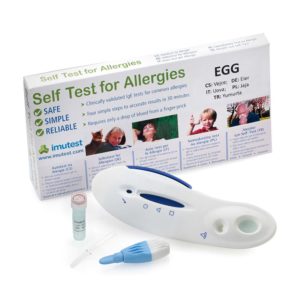In the UK, research has shown that six to eight per cent of British children have a food allergy. One of the most common is an allergy to eggs, which is often found in both children and adults.
Egg allergy is the result of egg protein producing an allergic reaction. The egg white contains most of the protein, but the yolk also contains it sometimes. The reaction is mostly found in children under 5 years of age and it usually starts when eggs are first introduced into their diet. Egg allergy rarely occurs in adult years. Adults who develop egg allergies might also have an allergic reaction to feathers or birds, however, this is not common in children.
What Are the Symptoms?
Most egg allergic reactions are mild. Symptoms usually happen immediately or within a couple hours of eating food containing eggs and include swelling around the mouth with redness sometimes and even vomiting. In some cases, diarrhoea and stomach ache are symptoms.
In rare instances, children might get allergic reactions that are more severe like coughing, problems breathing, a wheeze similar to asthma and even anaphylaxis.
In general, reactions don’t get worse unless the egg isn’t properly cooked or they are given more foods containing eggs. When egg foods accidentally come in contact with the skin, a slight rash might occur, but the symptoms aren’t usually dangerous. Egg allergies might make eczema worse, but this is tricky to diagnose because the symptoms take more time to show up.
Will the Allergy Disappear With Time?
Most kids outgrow their egg allergy by the time they reach school age and are able to eat highly cooked eggs like in cakes as well as lightly cooked eggs like scrambled and pancakes. Eventually, they’ll be able to tolerate uncooked eggs like mayonnaise and cake mix.
Kid’s whose allergic reactions were more severe like wheezing might require more time to outgrow their allergy and in some cases, they won’t outgrow it. In some instances, they might never be able to eat very lightly cooked or raw eggs, but they might be able to eat highly cooked eggs without an allergic reaction.
It’s important to note that there is no guarantee that an egg allergy will completely disappear with time. It’s always important to consult an allergist to determine the severity of the allergy and the likelihood of outgrowing it. Allergy testing and blood tests can help determine if the allergy is still present or if there has been a decrease in sensitivity.
Parents should also keep in mind that even if their child has outgrown an egg allergy, they should still be cautious and gradually introduce eggs into their diet to ensure they don’t have any adverse reactions. It’s also important to read food labels and check for any potential egg ingredients in prepared foods.
Overall, while many children do outgrow their egg allergy, every case is different and there is no guarantee. It’s important for parents to stay informed, work with their allergist, and take precautions to ensure the safety of their child.
How Is Egg Allergy Diagnosed?
Egg allergy is diagnosed by the history of prior reactions and the skin tests (SPT) or blood test (IgE/RAST) can be used to confirm. Popular choice for home testing include general allergy test kits and more specific tests which have been developed as egg allergy test kits.
What Is the Treatment?
Avoiding all food containing eggs is the best treatment and this will give the allergy time to go away on its own. If your child is able to tolerate egg foods that are highly cooked, you can keep giving them to him/her.
Many foods contain eggs, including pastries, cakes, meat products, desserts, glazes, battered and bread-crumbed foods, pasta, salad dressings, chocolates, sweets and ice cream. At the end of this leaflet, you will find more info on egg-free diets and cooking tips. The protein that causes the allergic reaction in hen’s eggs is the same in other bird species and should also be avoided.
You should always keep handy antihistamine syrup or tablets like chlorphenamine or cetirizine (ask your doctor for a prescription) and some like Zirtek), Piriton and Piriteze are available over the counter. The adrenaline auto-injector pen is only needed in high-risk cases of a severe allergic reaction and your child’s doctor will prescribe one if needed. If you do get an adrenaline injection, the doctor will give you a treatment plan and instructions on its use.
You also need to notify your child’s nursery, school or other caregivers about your child’s allergy and give them emergency antihistamine drugs and adrenaline if ordered by the doctor.
Eggs can be slowly reintroduced after a certain period, usually around 2 years old. At the appropriate time, your doctor might suggest you get your child retested for the egg allergy. If your child is low risk, find out from the doctor if you can start giving highly-cooked egg foods at home. When you are ready to reintroduce eggs, there is a helpful advice sheet available. In the more severe cases that include severe reactions like wheezing, you will need to make the decision to reintroduce eggs with the allergy specialist.
Australian researchers are working on a new treatment that may help ‘turn off’ egg allergies. Scientists working at the Murdoch Children’s Research Institute in Melbourne are studying if a plan of slowly introducing egg proteins into a child’s diet could put their allergy into remission.
Can My Child Have Their Routine Immunisations?
To protect your child from serious infections, we suggest they get fully immunised. Children who have allergic reactions to eggs have to be very careful with yellow fever and certain influenza vaccines, but the other vaccines including MMR should be given as usual. For children with egg allergies, it is safe to give them the nasal influenza vaccine (Fluenz®).
It is very rare that vaccines cause allergic reactions. It is a good idea to have the immunisation done at a hospital if the child is highly sensitive to egg products, especially if they experienced breathing problems or had a severe anaphylactic reaction in the past. An allergy team should oversee their treatment on an individual basis. If your child has a previous allergic reaction to a vaccine, they should be immunised in a hospital setting.
MMR – Measles Mumps and Rubella
When it comes to allergic reactions in children, the MMR has a great safety record. For primary care purposes, it is safe to give to children who are allergic to egg products. The MRR vaccine is produced on cultured-embryo-chick fibroblasts that are usually egg protein free. Even if there are traces of egg protein, it is so highly processed and with lower concentrations, the risk is dramatically reduced. Therefore, all infants and children with egg allergies can be immunised as usual in primary care.
Should I Keep Breastfeeding My Baby?
For breastfeeding mothers, any kind of food protein, including eggs will show up in trace amounts in your breast milk. If your baby isn’t showing any allergic reactions, it is ok to keep eating eggs as usual. If you see reactions like rashes or eczema, which could be a reaction to the egg products in your breastmilk, it might be a good idea to stop eating foods with eggs for a few weeks to see if there is any improvement in your baby’s symptoms. If there isn’t any improvement, then you can re-introduce eggs into your diet again.
Does Egg Allergy Mean My Child Is at Risk of Other Allergies?
The majority of children who are allergic to eggs already have eczema in their history. Compared to children without egg allergies, children who have egg allergies are more likely to develop asthma as they get older. Allergic reactions to other food are also more common with kids who are allergic to eggs, but other foods should still be introduced as usual.
I Have Another Child/Infant to Whom I Have Not Given Egg. When Should It Be Introduced Into Their Diet?
It is recommended that eggs should be given as part of the weaning diet from 6 months of age. Siblings are more likely to develop similar allergies; however, delaying the introduction of eggs after 6 months hasn’t been proven to eliminate the likelihood of your child developing an allergic reaction to eggs. Starting with highly cooked egg products like sponge cake, hard-boiled eggs and dried pasta is a good idea prior to introducing egg products that are lightly cooked.
More Information About Egg-free Diets and Cooking
Eggs are the main ingredients in foods like omelets, but they are also used in other food products. Powdered eggs are used in confectionery to produce a sticky texture like Chewitts, Cadbury Crème egg, Mars bars etc.
Mayonnaise has eggs that are raw or pasteurised. Egg-free mayonnaise is also available from health food stores and certain supermarkets.
Certain foods like breaded foods, ice creams etc. don’t always have eggs, therefore it is important to read the labels carefully or find alternative recipes if preparing at home. By law, any packaged food for sale in the EU that has eggs must be included on the ingredients on the label. Manufacturers are not required to place allergy warnings on the packages, but a number of them do. In non-EU countries, eggs might be listed as albumen or egg lecithin, ovalbumin (egg white).
Info regarding egg ingredients along with foods free of eggs is available via customer care and on the manufacturer’s website. This info is also available from the supermarket chains via their customer care desk or telephone lines. They are very useful when it comes to planning a daily diet.
In baked goods, eggs are usually used as a binder (keeps the ingredients together) or as a leavening agent (helps product to rise). Other ingredients like oil, fruit puree, mashed banana or baking powder can be used to replace eggs depending on the function it replaces. Health food stores carry commercial egg-replacers. Recipe books for egg-free cooking are also available and there are numerous egg free recipes available online. Most of the info is geared to the American market, therefore, you might need American measuring utensils to make cooking more enjoyable. Making egg-free pancakes and cakes at home is relatively simple.
For many parents, cooking egg-free can feel daunting at first. However, with a bit of practice it becomes second nature. Get creative by experimenting with egg substitutes like mashed banana, applesauce or commercial egg replacers in baking. Many vegan recipes are naturally egg-free as well. When dining out, don’t be afraid to ask questions. Most restaurants will happily modify dishes or let you know which menu items are egg-free. Travelling with an egg allergy requires some advance planning too. Research cuisine types and ingredients common in your destination. Bring safe snacks and look up allergy translation cards to easily communicate your needs. With some simple precautions, those with egg allergies can still explore new flavours and foods confidently.
Photo “Fried Egg” by Anthony Cunningham for Zoom Health
Zoom Health is a leading UK supplier of Home Health Tests and Earplugs






